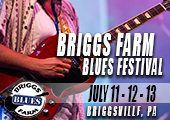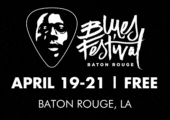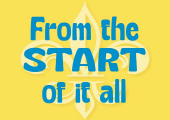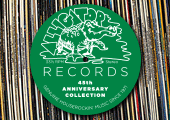WALTER WOLFMAN WASHINGTON
Feel So at Home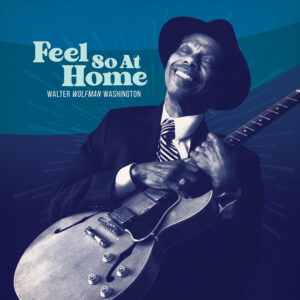
Tipitina’s Record Club – TRC-0305
Sure, today’s streaming model of music delivery gives us wonderous access to pretty much the entire universe of music in our phones; yet, it seldom provides the opportunity to savor and revel in the music.
Over the course of his more than 50-year career, New Orleans’ favorite son Walter Wolfman Washington has placed serving the music at the top of his to-do list. He began honing his chops in the 1950s backing up artists like his cousin, R&B belter Ernie K-Doe (who hit it big with the 1961 hit Mother-in-Law) and Irma Thomas. He soon began bringing his blend of soul, blues, R&B, and romantic ballads, all with ample amounts of swagger, as he and his trusty band, the Roadmasters, became regulars at New Orleans venues like Tipitina’s, the Maple Leaf Bar, and many others, while he became a stellar songwriter in the process.
In the liner notes for Feel So at Home, producer Ben Ellman says the album is meant to be listened to “in a single go” so the tender, smokey vibe envelops you. The spare, string- and woodwind-injected arrangements on the eight tracks are a continuation of the approach used on Washington’s highly regarded 2018 release My Future Is My Past that recast the blues/funk live wire as a soulful balladeer. That Feel So at Home was completed after Washington’s 2022 death at age 79 adds another level of poignancy.
The overture of woodwinds and swirling strings that opens I Feel So at Home Here give the song a timeless feel that sets the tone for the album. Originally appearing on Washington’s 1986 album Wolf Tracks, Without You is given a wistful treatment that imbues the lover’s lament with a subdued, sadly buoyant feel.
While the album creates a decidedly mellow experience, Washington at times deftly blends his blues and R&B tendencies. With minimal reverb, the clean guitar tone and sublime stand-up bass by James Singleton conjures an edgy, simmering take on Guitar Slim’s Along About Midnight, while the pulsing, staccato groove and lush strings of I’ve Been Wrong for So Long is matched by Washington’s snarling vocals.
With Washington’s resonant baritone that recalls Brook Benton, his tender guitar, and string swells, Lovely Day sounds like the perfect soundtrack to a dream. As his voice inhabits Charles Brown’s classic Black Night, Washington injects an urgency and heat to each word, as he sings “Nobody cares about me / I ain’t even got a friend / My baby’s gone and left me / when will my troubles end?” The up-tempo swing of Sufferin’ Mind, another Guitar Slim gem, rides along on a rolling bass line and shimmering orchestration before Washington’s scalding guitar brings it to life. Originally written for his 1981 release of the same title, It’s Rainin’ in My Life paints a melancholy picture of romantic pain and torment.
For best results, spin the vinyl release of Feel So at Home, pour a glass of your favorite libation, and find a quiet space to enjoy the final chapter of Washington’s storied career.
—Rod Evans
OMAR COLEMAN
Strange Times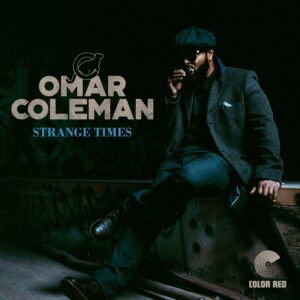
Color Red Records – CRED-306-VLP
Born and raised on Chicago’s West Side, vocalist and harmonica player Omar Coleman got his first well-deserved break when he was featured on Severn Records’ 2007 compilation of current-day Chicago harp players, Diamonds in the Rough.
The producer of Westside Soul, Coleman’s fourth album, introduced Coleman to Eddie Roberts, British-born guitarist of acclaimed modern funk/boogaloo group the New Mastersounds; around the time of that meeting, Roberts launched his own record label, Color Red. In 2020 Roberts scheduled recording sessions, and the resulting nine-song Coleman album, Strange Times, was scheduled for release in 2021.
Strange times indeed: owing both to worldwide lockdowns and supply chain issues, Coleman’s Color Red debut—a vinyl-only release—would be delayed more than two years, finally appearing in early 2024. And while that delay likely frustrated Coleman, it’s well worth the wait. Roberts’ determinedly organic and analog approach to the recording studio—coupled with Coleman’s artistry and his gift for coming up with meaningful lyrics essentially on the fly—has resulted in a superb album.
Deep grooves and spirited horns provide rock-solid backing for Coleman on the autobiographical Chicago. Shades of Otis Redding make themselves known in Coleman’s voice, and the tune’s vibe has an Albert King feel, albeit with harp—not electric guitar—as its focus instrument. Roberts leads the band and plays guitar, but he wisely leans back, keeping the spotlight squarely on Coleman.
On the title track, Roberts engages in instrumental dialogue with the horns, and the rhythm section lays down a moody, vaguely sinister feel. Strange Times’ arrangement hearkens back to ’70s blaxploitation soundtracks like Super Fly and Shaft, and a soaring yet subtle string section heightens that character. Here, Coleman focuses on his soaring vocal, leaving the harp on the table until halfway through the song; at that point he turns in a hearty extended solo.
You’ve Been Cheatin’ has a character that will be familiar to fans of the New Mastersounds’ trademark sound. But Coleman adds a What’s Going On–era Marvin Gaye feel to the song, and Roberts’ production serves to reinforce those values. Coleman’s solo evokes thoughts of Stevie Wonder, but the song remains rooted in the blues.
The rousing Slow Down Baby mines a Stax feel, with a kinetic rhythm section, beefy and whip-smart horn charts. Coleman howls and shouts in between the lyric lines, and when he blows like mad on a harp solo, the band storms along right behind him. In the song’s second half, Roberts peels off some wonderful, compact solo riffs in response to Coleman’s singing. On an album with no weak tracks, Slow Down Baby may well be the four most exciting minutes on the whole set. And that’s saying something; after the wait, Strange Times should go down as one of the year’s best releases.
—Bill Kopp
KEVIN BURT & BIG MEDICINE
Thank You Brother Bill: A Tribute to Bill Withers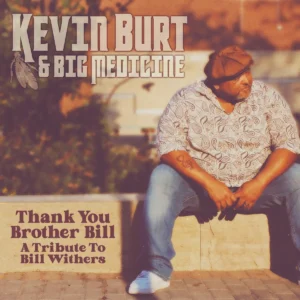
Gulf Coast Records – GCRX9047
Iowa bluesman Kevin Burt is a self-taught guitarist, harmonica player, and vocalist with a uniquely soulful delivery. His 2020 Gulf Coast Records debut, Stone Crazy, was a solid contemporary blues outing. On Thank You Brother Bill, Burt gets more adventurous and pays heartfelt tribute to R&B legend Bill Withers. In the album’s liner notes, Burt states, “Listening to Bill Withers tell a story or sing a song for me is one and the same. It instantly attaches itself to my soul.” The passion and musicianship that run through every track reflect Burt’s deep connection to Withers’ music.
Opening track Who Is He (and What Is He to You)? introduces listeners to the outstanding chemistry between Burt and his backing band. Drummer Eric Douglas and bassist Scot Sutherland have a knack for laying down spandex-tight grooves. Burt’s voice is a powerful instrument—it’s warm and endearing with a touch of gravel when needed. Kissing My Love sports an energetic, funky arrangement that allows Burt and Big Medicine to strut their stuff. Sutherland and Douglas’ rhythm work is rock solid, and Valdez gets plenty of room to stretch out on guitar. Burt’s vocals pack a powerful punch, and his harmonica is icing on the cake.
It’s hard for a musician to put their own stamp on an iconic hit, but Burt pulls it off with Just the Two of Us. The familiar lyrics and melody are backed up by a sparse, elegant arrangement. Burt’s voice is honey smooth, and his harp blowing adds a taste of down-home grit. Ain’t No Sunshine is another familiar warhorse that Burt makes his own. He bares his soul on the vocals, effortlessly moving from sensual moans to full-throated growls. Burt’s reading of Grandma’s Hands captures the wistful, introspective feel of Withers’ performance. The guitar-driven arrangement stirs some hard rock crunch into the mix, and Sutherland’s bass holds down the bottom end.
On the self-penned title track, Burt sings, “There would be so many holes in the soul if your music wasn’t here.” It’s a poignant reminder of the love and dedication that went into his latest project. Listeners are bound to be moved.
—Jon Kleinman
TINSLEY ELLIS
Naked Truth
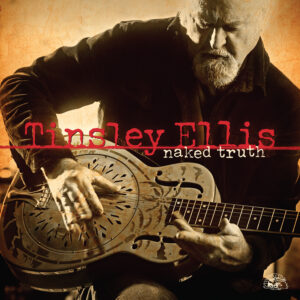
Alligator Records – ALCD 5017
If you asked a dozen blues writers to come up with a list of acoustic singer-songwriter guitarists, Tinsley Ellis would not be on it. Up to now, the seasoned Ellis was known solely as a fiery blues rock guitarist with a string of popular albums. Now, with his new, first-ever solo acoustic record, Naked Truth, we see another side of the Atlanta-based guitarist. Truehearted roots and blues acoustic fans can rejoice; Naked Truth is a splendorous listening pleasure. Good stuff wall to wall.
Ellis is no stranger to solo performance. Alligator reports that in the last 12 months, Ellis has performed over 100 solo shows. He has been recording and traveling the world for over four decades, and by now he surely knows how to put down some explosive blues, clearly not only with an electric band. It’s easy to recognize that any guitarist in his top-tier class will know how to play an acoustic guitar, and Ellis proves that he is just as badass solo acoustic as he is as an electric blues rocker.
Naked Truth is a potent set of a dozen equally fierce songs steeped in the folk blues traditions, including nine newly written originals. The album was recorded live in the studio using Ellis’ 1969 Martin D-35 (a gift from his father) and his 1937 National Style O series guitars.
Hold on to your hat and get ready for a foot-stomping good time, delightful in both the raucous, raw barrelhouse clamber, as in Death Letter Blues by Son House and Don’t Go No Further by Willie Dixon, and the gentler, tender and emotive instrumentation as in The Sailor’s Grave on the Prairie by Leo Kottke. When playing solo acoustic, the artist has to carry it all, and Ellis delivers a powerful punch of deep roots blues, wicked guitar prowess and, importantly, these songs will get your soul twanging with that soothing, exuberant sensitivity that only music can bring. You’ll feel it down to the bone.
On Windowpane he eerily evokes the spirit of Skip James. Ellis’ original Devil in the Room comes from an expression by his friend, the late Col. Bruce Hampton, who would tell his musicians just before a show was to begin, “We’re here to put the devil in the room.” So much for negating the old “devil’s music” curse. Ellis puts down some slashing Delta-style slide work on his National resonator on Tallahassee Blues and Horseshoes and Hand Grenades then brings on a few more beautiful original instrumentals that nicely balance the vibe: Silver Mountain and Alcovy Breakdown. He closes the album with an impressive, sweet fingerpicking instrumental on the Martin D-35, Easter Song.
Naked Truth is simply a joyous and triumphant celebration of acoustic music and the transcendental nature of the original country blues. All by Mr. Tinsley Ellis, a least expected, but most welcomed source.
—Frank Matheis
MATHIAS LATTIN
Up Next 
VizzTone – VT-ML-01
The Texas guitarist and singer Mathias Lattin (profiled in LB #286) emerged to much acclaim in the year of his 21st birthday. Since winning first place with his trio, as well as the individual Best Guitarist award, at the 2023 International Blues Challenge, this rising star has gained stage experience and exposure far beyond his hometown of Houston. On this, his debut full-length album (following a 2021 EP), Lattin plays lead guitar and vocalizes soulfully on a set of songs that he also wrote. Serving as his own producer (and even his own bassist on three of the cuts), the wunderkind ultimately incorporates instrumental contributions from 11 additional supporting players—on organ, piano, sax, trumpet, rhythm guitar, bass, and drums—over the course of ten solid tracks.
Drawing from his background in a jazz studies program, Lattin infuses his blues with a cool sophistication balanced by a disciplined yet passionate intensity. Whether soloing, riffing, or chording, the guitar work on Up Next often suggests an informed musical imagination that finds delight in nuanced phrasing and subtle embellishments. Yet, Lattin can also deliver timeless blues licks full of emotive expressionism. As for his compositions, while some of the songs remain rooted in the familiar 12-bar structure, others evolve beyond that framework to include melodic bridges and choruses more common in classic R&B.
On the other hand, with a few exceptions (such as the celebratory track Party), the general focus of the lyrics is limited to perhaps the most common of all themes, the failure of a love affair. Much of the writing consists of a first-person voice suspiciously if not scornfully beseeching, warning, accusing, or dismissing an unfaithful partner. In fact, numbers such as Who’s Been Loving on You, You Know This Won’t Do, You Don’t Love Me No More, I Tried So Hard, and others all milk the well-worn breakup motif for all its worth. Nonetheless, Lattin occasionally flashes a flair for fine wordplay. On Lose Some Weight, for example, the titular phrase turns out not to be a literal reference to cutting calories but a metaphor expressing the need to part ways with a psychologically toxic lover.
Another particularly well-crafted track, both lyrically and musically, is the horror story song titled 2nd Degree. Sonically, it is a heavy bass-thumping, big drum–pounding, hard blues–rocking maelstrom of menace, replete with six-string salvos of wah-wah pyrotechnics. Befitting that raucous context, the singer’s voice is distinctly distorted via a mic filter, muttering lines that ultimately implicate him in a murder. As this grievous verse narrative reaches a climax, the stressed-out protagonist discovers himself to be “wearing handcuffs” but he also claims, “I don’t know why.” Then, as the music forges on, a simplistic and eerie “la-la-la-la” vocal chant arises, echoing the fundamental groove. It’s a chilling effect, highlighting Lattin’s capacity for conjuring drama via songwriting and production.
All in all, Up Next is an entertaining album—and a suitable showcase for this youthful newcomer’s impressive and multifaceted yet still developing talents. Given Lattin’s obvious musical savvy and tender age, it seems safe to hope, if not assume, that his best work lies ahead.
—Roger Wood
BOB CORRITORE & FRIENDS
Phoenix Blues Rumble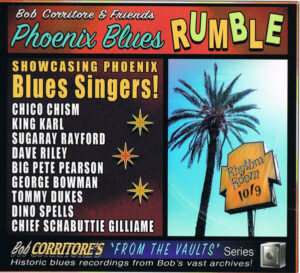
Vizztone/SWMAF – SWMAF 22
Every time Phoenix harp powerhouse and blues empresario Bob Corritore takes a dive into his “From the Vaults” series of recordings, he emerges with another gem from his seemingly bottomless well of pure, unadulterated raw blues.
To date, Corritore has released 14 long players under the title of Bob Corritore & Friends, curated from jams with local, regional, and national blues icons in town to play at Corritore’s Rhythm Room nightclub. The venue has evolved as the epicenter of the Phoenix blues world since its opening there in 1984. As leader of the Rhythm Room All-Stars, Corritore often backed artists passing through town and was able to arrange studio time with them as well.
The recordings don’t break any new artistic ground, but they provide an enduring platform for old and new blues artists to display what makes them great. And they never disappoint. On Phoenix Blues Rumble, Corritore presents 12 tracks recorded between 1987 and 2017. All but one of the featured artists here are inductees into the Arizona Blues Hall of Fame, and the lone exception, soul/blues belter Sugaray Rayford, is a Phoenix resident who’s crafting a career that may someday find him rubbing elbows with the Hall of Famers.
The list of stalwarts is impressive. Chicago singer/drummer Chico Chism shared the stage with the likes of Muddy Waters, Sonny Boy Williamson II, and Howlin’ Wolf before moving to Phoenix at the behest of Corritore in the ’80s. His gutbucket vocals kick things off with his ode to plus-sized women, Big Fat Woman 480 LBS.
With a voice as rough as 24-grit sandpaper, Egyptian-born Arizona blues icon Chief Schabuttie Gilliame shines on a couple of the album’s highlights: Come to Me Baby, featuring sublime guitar by Kirk Fletcher, and Leopard Speckled Baby, where he pledges allegiance to freckled women and is joined by ace Louisiana piano player Henry Gray.
Walking in the Park rocks like a classic Little Richard tune driven by the polished vocals of King Karl, who helped create the mashup of rock, blues, and ballads known as the “swamp pop” sound, and spent time as the featured singer in Lloyd Price’s band. On Nine Times Out of Ten, Mississippi-born George Bowman delivers a delicious slice of Delta blues.
The slow burn I’m Evil features the passionate energy of Phoenix blues north star Big Pete Pearson. Rayford lends his force of nature pipes to The Glide, a soulful shuffle that tells the tale of a white lightnin’–fueled, three-legged horse.
While the players and singers change from track to track, the one constant is Corritore’s versatile harp. Whether he’s plumbing the depths of despair with a deep, husky tone or soaring with the eagles on upper register runs, he proves why he’s one of the best harp masters in the game today, as well as a savvy producer with a great ear.
There’s nothing revolutionary about Phoenix Blues Rumble, but that’s the beauty of it: blues played by true blue artists who’ve dedicated their lives to it.
—Rod Evans
JAMES HARMAN
Didn’t We Have Some Fun Sometime
Electro-Fi – 3465
When James Harman died on May 19, 2021, he had been working on a number of songs for inclusion on his next album, and they’re now collected on Didn’t We Have Some Fun Sometime. Eight of the songs are from livestream performances Harman and the band recorded during the pandemic, and the other four songs on the album come from various past studio recordings. What’s consistent through all the songs is Harman’s joy in making music and his ability to move through a variety of blues styles, revealing the depth of his immersion in the music.
The album opens with the rollicking stride blues Pick Up the Slack, taken from a livestream performance, which features Harman’s wailing harp riding over Nathan James’ shimmering layers of guitar chords and Harman’s slyly humorous lyrics about the nature of relationships. Harman and the band are having fun, as they laugh and giggle throughout the track. Percolating percussion drives the funky world rhythms of A Rut and a Groove, while Work Don’t Come to Me rides along a Chicago blues groove that mingles with a Memphis soul blues vibe. Harman settles into a funked groove on the talking blues Who’s Got the Geetus, illustrating his fondness for a good story and his charismatic style of telling it. The rhythms of the acoustic blues That Old Clock mimic the ticking of a clock as the funked-up, slow-burning song ponders the passage of time and its meaning for our lives. Rambling jazz joint piano courses through the skittering New Orleans blues Trouble Loadin’ Mama, while the album closes with the moving gospel-inflected title track.
Didn’t We Have Some Fun Sometime reminds us of Harman’s great and enduring artistry, celebrating his life and music with many of his most memorable songs.
—Henry L. Carrigan Jr.
DANIELLE NICOLE
The Love You Bleed
Forty Below – FBR 038
Electric bassist and singer Danielle Nicole (Schnebelen) debuted with siblings Nick and Kris as Trampled Under Foot in 2000. After honing both her considerable chops and stage presence with that group for well over a decade, Nicole released her solo debut, Wolf Den, in 2015. While her work has long had its foundation in the blues, Nicole often uses the idiom as a jumping-off point for her musical excursions.
While 2018’s Cry No More displayed her affinity for (and understanding of) the classic Stax Records soul vibe, on her latest, The Love You Bleed, Nicole initially aims toward a more mainstream classic rock character. The album’s opener, Love on My Brain, shows the strong vocals that characterize Nicole’s approach. The insistent, hypnotic drum figure and effective dynamics anchor the song, and Nicole’s lyrics explore the love and pain that inform life.
The soul character of her previous album resurfaces on Make Love. Nicole’s smoldering, sultry vocal performance makes Right by Your Side a standout, and the overdubbed chorus harmonies are spot-on. The simmering, snaky, whammy-bar effects on How Did We Get to Goodbye give the song a haunting character, and Nicole’s vocals reinforce that feel.
A stomping blues character informs Head Down Low. Sustained slide guitar runs are well-placed in the arrangement. Some of the album’s most memorable guitar riffs show up on Fireproof. The stripped-down arrangement of A Lover Is Forever features only guitarist Brandon Miller and Nicole’s voice; it’s an exemplar of subtlety on a record otherwise characterized by full-bodied rock (or blues, or soul-informed) arrangements.
Say You’ll Stay extends the gentle character of the previous tune, albeit in a full-band format. Judiciously used string arrangements add just the right touch, and Nicole’s impassioned vocals are at the center of things. A stuttering beat with a ’70s blues funk feel makes Fool’s Gold a solid tune, but like most everywhere on The Love You Bleed, the instrumental work exists mainly to support Nicole’s vocals.
Walk on By is a gutsy original rocker, not the Burt Bacharach / Hal David classic. Nicole’s bass is in lockstep with the guitar figures, and her overdubbed harmonies round out the arrangement. A smoky, late-night, country-tinged weeper, Who He Thinks You Are makes the point that Nicole is every bit as authentic and compelling on an inward-looking tune as when she swings for the arena-rock fences.
More country textures show up for the album’s closing track, Young Love on the Hill. Mandolin, strings, and some subtle drum work provide a cozy musical bed for Nicole’s ode to love. Nicely varied throughout, The Love You Bleed can serve as a sampler of Danielle Nicole’s wide-encompassing approach to her craft; it’s also a very pleasing listening experience.
—Bill Kopp
MIKE ZITO
Life Is Hard
Gulf Coast Records – No #
Mike Zito’s tellingly titled new album arrives in the aftermath of a personal tragedy, the loss of his wife, Laura, to cancer in 2023. As with any artistic offering, it shares emotions felt at the time of creation, but in this particular case, it offered the means to excise the shock and sadness that comes when circumstances conspire to tear one’s world apart.
Fortunately, Zito had some support in his efforts, courtesy of co-producers Joe Bonamassa and Josh Smith, Reese Wynans on keyboards, Calvin Turner on bass, Lemar Carter on drums, and various other ancillary instrumentalists and singers who contributed to the recording. Of course, Zito’s always been a team player. His stint in the supergroup Royal Southern Brotherhood garnered widespread acclaim and brought Zito himself accolades that he later built upon courtesy of production assignments for the likes of Samantha Fish, Albert Castiglia, Ally Venable, Jeremiah Johnson, Jimmy Carpenter, and others. His own albums topped the charts and reaped continued critical kudos, and his partnership with Castiglia in the band the Blood Brothers elevated his profile even further until his wife’s illness forced him off the road.
It’s little surprise then that Zito’s own passion and perseverance take center stage at this particular juncture, although he mostly depends on outside material to get his point across. Tinsley Ellis, Walter Trout, Tab Benoit, and Fred James are among the contemporary contributing songwriters, while classic tracks by Little Milton and Reverend Gary Davis ensure a timeless template. There are some surprises in the mix—a stirring take on Stevie Wonder’s Have a Talk with God reflects Zito’s spiritual side, while an unexpected cover of the Guess Who classic These Eyes combines the smooth sway of the original with an unmistakable edge and intensity.
Zito retains his incendiary approach overall, be it through the rocksteady stride of Lonely Man, the scorching title track, the rousing repast No One to Talk To (But the Blues), or the riff-ready execution that marks Nobody Moves Me Like You Do. The soulful strains that characterize Forever My Love and the overarched approach given the track titled Darkness offer evidence that Zito’s emotions fluctuated throughout. A solitary cover of the Rev. Davis’ Death Don’t Have No Mercy, featuring gospel-like harmonies, is particularly poignant in light of Zito’s loss.
While Zito can count any number of triumphs over the course of his career, Life Is Hard is particularly significant. It’s an exacting effort and accomplishment.
—Lee Zimmerman
PATTI PARKS FT. JOHNNY RAWLS
Come Sing with Me
VizzTone – VT-PP02
Acclaimed Buffalo-based vocalist Patti Parks is also a longtime health care professional, and the sensitivity such work demands can be heard throughout Come Sing with Me. Each of this album’s ten tracks cuts to the heart with empathetic directness, and the music surrounding Parks’ distinctive raspy vocals adds to this uncommon sincerity.
It should come as no surprise that Parks and her musicians truly know their way around a ballad, as is readily apparent on the subtly poetic One Foot Out the Door. Guitarist Aaron Flynt provides tenderly felt phrases, and drummer Aaron Blackmon puts just the right drag behind Parks’ heart-searing delivery. The melodic basslines of Tony Camilleri and Robin Grandin’s ardent backing vocals give Why a gently entreating tone, Parks slipping from girlish high notes to a sighing tremolo as she beseeches an unfaithful love.
But Parks also delivers when it’s time to party, as on the raunchy come-on Hamburger Man; Richard Rosenblatt’s harmonica and the horns of saxophonist Kenny Parker and trumpeter John Maguda perfectly complement Parks’ knowing lustiness. A Lotta Man, a delightful ode to full-figured fellas written by Derrick Procell and Terry Abrahamson (also responsible for One Foot Out the Door), packs spicy grooves from percussionist Kenny Thomasula and drummer Hugh Arthur, with Parks scoring laughs as she declares her passion for a guy who “gives me the chocolate shakes.”
Vocalist/guitarist Johnny Rawls makes several vital contributions to Come Sing with Me. He and Parks mix it up beautifully amidst the mellow instrumentation of I’m in Love with You Baby, and the gentility of his guitar smoothly contrasts his no-nonsense voice on the steady-rollin’ How Much Longer. This track and the biting I’m Sorry also provide lovely showcases for Rawls’ horn arrangements, trumpeter Rick Keller making a particularly muscular impression on the latter.
The album’s other secret weapon is Parks’ husband, organist/pianist/composer Guy Nirelli, who brings exultant swing behind backing vocalists Kimera Lattimore and Zuri Appleby on Sing Around the World. Nirelli’s album-closing composition, Good Day for the Blues, allows him to swagger joyfully over the ivories, and he provides a similarly zesty playground for Parks and guest pianist Anthony Geraci on the walloping DJ’s Boogie (I Like to Boogie). Skillfully recorded by Anthony Casuccio so every instrument gleams in the ear, Come Sing with Me is an easy yet substantial listen, always highly enjoyable.
—Matt R. Lohr


